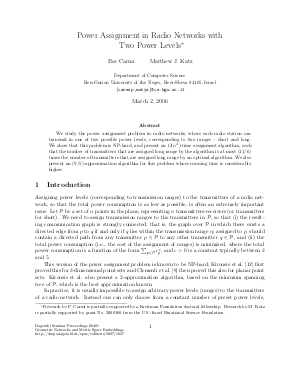Power Assignment in Radio Networks with Two Power Levels
Authors Paz Carmi, Matthew Katz
-
Part of:
Volume:
Dagstuhl Seminar Proceedings, Volume 6481
Part of: Series: Dagstuhl Seminar Proceedings (DagSemProc) - License:
 Creative Commons Attribution 4.0 International license
Creative Commons Attribution 4.0 International license
- Publication Date: 2007-06-01
File

PDF
DagSemProc.06481.3.pdf
- Filesize: 278 kB
- 18 pages
Document Identifiers
Subject Classification
Keywords
- Radio networks
- power assignment
- approximation algorithms
- minimum spanning tree
- disk graph
Metrics
- Access Statistics
-
Total Accesses (updated on a weekly basis)
0Document
0Metadata
Abstract
We study the power assignment problem in radio networks, where each radio station can transmit in one of two possible power levels, corresponding to two ranges - short and long. We show that this problem is NP-hard, and present an O(n^2)-time assignment algorithm, such that the number of transmitters that are assigned long range by the algorithm is at most (11/6) times the number of transmitters that are assigned long range by an optimal algorithm. We also present an (9/5)-approximation algorithm for this problem whose running time is considerably higher. Next, we formulate and study the Minimum-Area Spanning Tree (MAST)problem: Given a set P of n points in the plane, find a spanning tree of P of minimum "area," where the area of a spanning tree T is the area of the union of the n-1 disks whose diameters are the edges in T. We prove that the Euclidean minimum spanning tree of P is a constant-factor approximation for MAST. We then apply this result to obtain constant-factor approximations for the Minimum-Area Range Assignment (MARA) problem, for the Minimum-Area Connected Disk Graph (MACDG) problem, and for the Minimum-Area Tour (MAT) problem. The first problem is a variant of the power assignment problem in radio networks, the second problem is a related natural problem, and the third problem is a variant of the traveling salesman problem.
Cite As Get BibTex
Paz Carmi and Matthew Katz. Power Assignment in Radio Networks with Two Power Levels. In Geometric Networks and Metric Space Embeddings. Dagstuhl Seminar Proceedings, Volume 6481, pp. 1-18, Schloss Dagstuhl – Leibniz-Zentrum für Informatik (2007)
https://doi.org/10.4230/DagSemProc.06481.3
BibTex
@InProceedings{carmi_et_al:DagSemProc.06481.3,
author = {Carmi, Paz and Katz, Matthew},
title = {{Power Assignment in Radio Networks with Two Power Levels}},
booktitle = {Geometric Networks and Metric Space Embeddings},
pages = {1--18},
series = {Dagstuhl Seminar Proceedings (DagSemProc)},
ISSN = {1862-4405},
year = {2007},
volume = {6481},
editor = {Joachim Gudmundsson and Rolf Klein and Giri Narasimhan and Michiel Smid and Alexander Wolff},
publisher = {Schloss Dagstuhl -- Leibniz-Zentrum f{\"u}r Informatik},
address = {Dagstuhl, Germany},
URL = {https://drops.dagstuhl.de/entities/document/10.4230/DagSemProc.06481.3},
URN = {urn:nbn:de:0030-drops-10277},
doi = {10.4230/DagSemProc.06481.3},
annote = {Keywords: Radio networks, power assignment, approximation algorithms, minimum spanning tree, disk graph}
}
